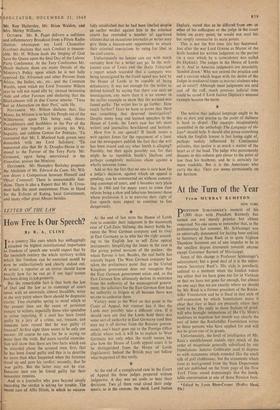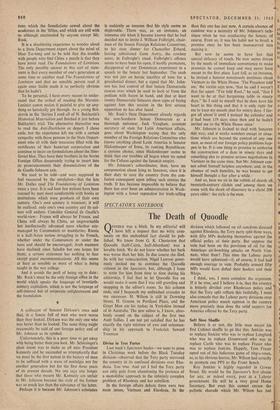At the Turn of the Year
From MURRAY KEMPTON
NEW YORK
PROFESSOR SCHLESINGER'S memoir of his 1,000 days with President Kennedy has turned out not merely popular but almost venerated. No one seems to remember that, in the preliminaries last summer, Mr. Schlesinger was so universally denounced for having been unkind to Secretary of State Rusk as to quite frighten Theodore Sorensen out of any impulse to be in the smallest degree irreverent towards anyone except Governor Barnett of Mississippi.
Some of this change is Professor Schlesinger's achievement; but a good deal of it is the unfor- tunate Secretary Rusk's. His style is peculiarly unfitted to a moment when the loudest voices say either that we have gone too far in Vietnam or that we have not gone far enough, but almost no one says that we are exactly where we should be. Mr. Rusk is a former president of the Rocke- feller Foundation and he is fixed in that style of self-expression by which foundations make it clear that they at least are precisely where they want to be. His reply to those Italians of good- will who brought intimations of Ho Chi Minh's readiness to negotiate last month was clearly the sort of letter the Rockefeller Foundation writes to those persons who have applied for and will not be given one of its grants.
Unfortunately, the level of intelligence of Mr. Rusk's establishment sounds very much of the order of magnitude generally subsidised by our foundations. Senator Goldwater used to depress us with statements which sounded like the small talk of golf clubhouses; but the statements which issue as background from the State Department and are published on the front page of the New York Times sound depressingly like the lunch- table conversation at one of those Russian Insti- tutes which the foundations sowed about the academies in the 'fifties, and which are still with us although unattended by anyone except Mr. Rusk.
It is a shuddering experience to wonder aloud to a State Department expert about the mind of Mao Tse-tung and to be told that the trouble with people who find China a puzzle is that they have never read The Foundations of Leninism. The only possible answer to this sort of state- ment is that every member of one's generation at some time or another read The Foundations of Leninism and that no sensible person read it again once Stalin made it so perfectly obvious that he hadn't.
To be personal, I have every reason to under- stand that the ordeal of reading the Marxist- Leninist canon makes it painful to give up any- thing so heroically got through. As a young Bol- shevik in the 'thirties I read all of N. Bukharin's Historical Materialism and finished it just before Bukharin's trial. The alternative thereafter was to read the A nti-Durkheim or depart. I chose exile, but the experience left me with a certain sympathy with those persons in the State Depart- ment who sit with their treasuries filled with the certificates of their bankrupt corporation and continue to insist on formulations about the Sino- Soviet bloc. They have their brothers in the Soviet Foreign Office desperately trying to insert into its pronouncements their denunciations of the de Gaulle-Johnson axis.
We used to be told—and were supposed to feel reassured by the revelation—that the late Mr. Dulles read The Foundations of Leninism twice a year. It is sad how few nations have been rescued by men most comfortable with books or institutions which were products of their own century. One's own century is transient; it will be outlived; only one's own country and its cul- ture will endure. Consider General de Gaulle's world-view: France will always be France-, and China will always be China, an ungovernable but intellectually advanced mess whether mis- managed by Communists or mandarins; Russia is a half-Asian nation struggling to be French, whether under the Communists or under the tsars and should be encouraged; Arab manners have declined since Saladin but one hopes for them; a serious statesman has nothing to fear except papal excommunications. All this seems at least as sensible as most of what is being taught in the war college.
And it avoids the peril of being up to date: Mr. Rusk's must be the only foreign office in the world which speaks the language of twentieth- century capitalism, which is not the language of self-interest but of corporate enlightenment and the foundation.
A colleague of Senator Dirksen's once said that, in a Senate full of men who were worse than they looked, Dirksen was the only one who was better than he looked. The same thing might reasonably be said of our foreign policy and of Mr. Johnson as its symbol.
Unfortunately, this is a poor time to get away with being better than you look. Mr. Schlesinger's plain intent was to make us all miss President Kennedy and he succeeded so triumphantly that we must be the first nation in the history of man to be suffused with a wave of nostalgia not for another generation but for the first three years of its present decade. No one says any longer that those who mourn Mr. Kennedy are unfair to Mr. Johnson because the style of the former was so much less than the substance of the latter.
Perhaps it is because Mr. Johnson's substance
is suddenly so tenuous that his style seems so deplorable. There was, as an instance, an immense stir when it became known that he had decided not to invite J. William Fulbright, chair- man of the Senate Foreign Relations Committee, to his state dinner for Chancellor Erhard, having substituted Gene Autry, the cowboy actor, in Fulbright's stead. Fulbright's offence seems to have been his open, if hardly premature, disapproval of our Dominican experiment in a speech to the Senate last September. The snub was not just an heroic sacrifice of tone for a presidential dinner, but a signal that Mr. John- son has lost control of that Senate Democratic caucus over which he used to look at from the podium with baton in hand, and that at least twenty Democratic Senators show signs of fusing against him this session in the first serious opposition he has eVer faced.
Mr. Rusk's State Department already regards the non-Southern Senate Democrats as a thorough nuisance; Jack Vaughan, assistant secretary of state for Latin American affairs, goes about Washington saying that the only member of the Foreign Relations Committee who knows anything about Latin America is Senator Hickenlooper of Iowa, its ranking Republican; a curious choice, since Hickenlooper seems to think that our troubles all began when we opted for the Cubans against the Spanish empire.
Mr. Johnson's subordinates, then, have no compunction about lying to Senators, since it is their duty to save the country from the con- fusion consequent upon telling such ninnies the truth. It has become impossible to believe that there has ever been an administration in Wash- ington with a lower reputation for truth-telling
than this one has just now. A certain absence of candour was a necessity of Mr. Johnson's tech- nique when he was conducting the Senate, of course. Even so, it was his habit not to break a promise once he has been manoeuvred into making it.
But now he seems to have lost that special delicacy of touch. He now seems driven by the needs of immediate convenience to make promises he cannot keep and may never have meant in the first place. Last fall, as an instance, he invited a Senator notoriously mutinous about Vietnam to the White House. 'The President told me,' the victim says now, 'that he and I weren't that far apart. "I've told Rusk," he said, "that I want to be at that bargaining table in ninety days." So I said to myself that he does have his heart in this thing and that it is only right for me to keep my mouth shut for ninety days. I for- got all about 'it until I noticed the calendar and it had been 119 days since then and he hadn't invited me to the White House since.'
Mr. Johnson is trained to deal with Senators this way, and it works wonders except in situa- tions which are beyond the control of any one man, as most of our foreign policy problems hap- pen to be. It is one thing to promise to authorise the construction of a dam in ninety days and something else to promise serious negotiations in Vietnam in the same time. But Mr. Johnson can- not admit himself helpless anywhere; and, in the absence of such humility, he was bound to get himself thought a liar after a while.
And so, here we sit in the rubble of shards oc twentieth-century clichés and 'among them we come with the shock of discovery to a cliché 200 years older : the style is the man.

















 Previous page
Previous page